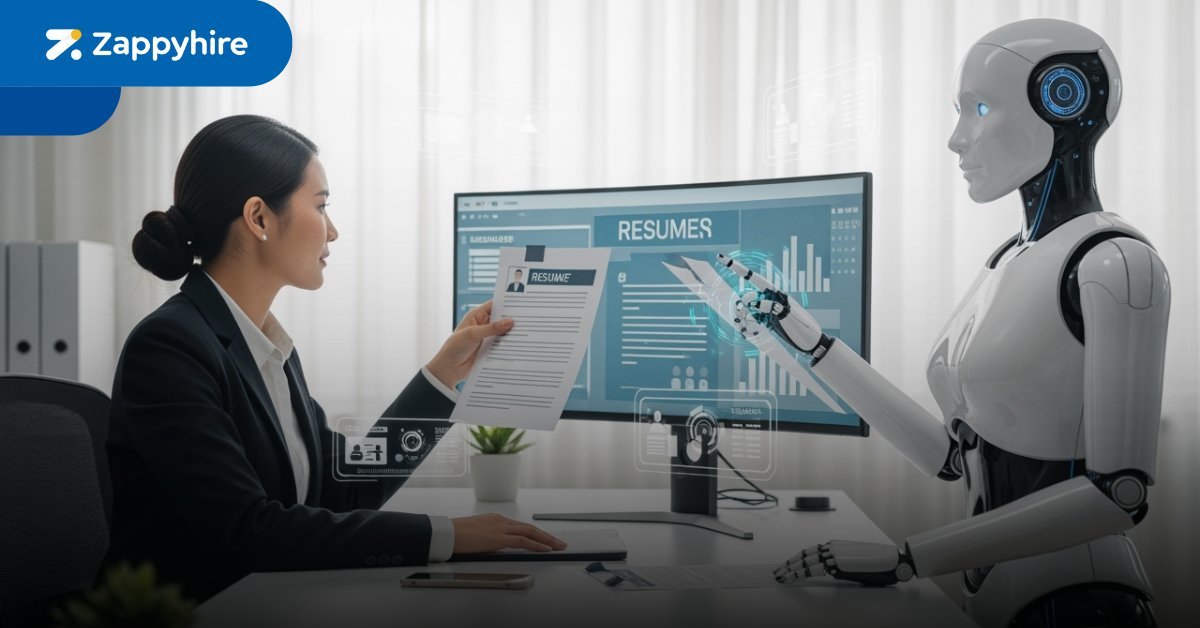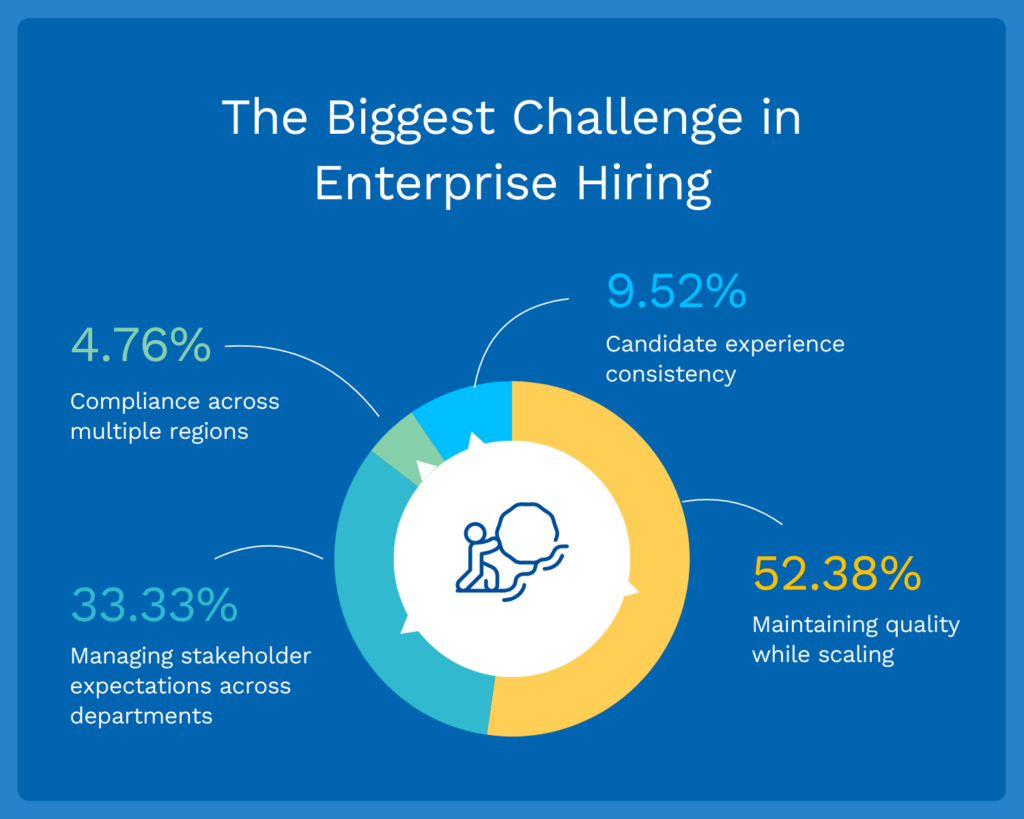
Artificial Intelligence (AI) has quietly been influencing recruitment for over a decade – starting with resume parsing and automated job-matching, then evolving into chatbots, predictive analytics, and AI-driven video interviewing.
But 2025 marks a tipping point. For enterprises, the conversation is no longer “Should we integrate AI into recruitment?” It’s “How fast can we do it, and how do we do it right?”
In the recent panel discussion The Enterprise Hiring Paradox: Speed vs. Quality at Scale, industry leaders explored why AI has become indispensable in enterprise recruitment, the integration challenges they face, and how to balance automation with the human touch.
The panel featured:
- Samira Dash – Head of Human Resources, Next Education India
- Keerthy Krishna Swamy – Head of IT Projects, Dr. Agarwal’s Group of Eye Hospitals; EVP of Technology, PMI Kerala Chapter
- Deepu Xavier – Co-founder, Zappyhire
The conversation revealed why AI adoption has accelerated and how enterprises can approach it strategically.

Why the push for AI in recruitment is happening now
Enterprise hiring has evolved from filling positions to orchestrating complex, high-stakes talent acquisition ecosystems.
- Multi-layered approval processes
- Stakeholder alignment across business units and geographies
- Compliance requirements that differ from one jurisdiction to another
- Maintaining a consistent candidate experience at scale

“What works for 50 hires a year will break completely at 1,000 hires.”
— Deepu, Zappyhire
This is where AI in recruitment becomes critical. It’s not a silver bullet, but without it, the speed–quality trade-off becomes unmanageable:
- Prioritize speed, and you risk poor fits, higher attrition, and damaged brand reputation.
- Prioritize quality, and you risk losing top talent – especially as high-quality candidates typically leave the market in 15–18 days.
AI in recruitment promises a third path: scaling without sacrificing quality.
How the use of AI is changing from a support tool to a strategic enabler
One of the most striking messages from the panel was that AI in recruitment is shifting from a support tool to a strategic enabler.
“AI will not replace HR professionals. But HR professionals who embrace AI will replace those who don’t.”
— Deepu Xavier, Zappyhire
In the early days, AI in recruitment was mostly about efficiency… reducing manual effort in resume screening, scheduling, and status tracking. Now, it’s about enabling better hiring decisions by:
- Analysing candidate data in real-time
- Predicting job success based on patterns
- Enabling recruiters to focus on high-value interactions
Samira noted that AI must enhance, not replace, the personal touch that defines great hiring experiences:
“Employer branding and personal touch are core to enterprise hiring – AI will protect and enhance that, not erode it.”
— Samira Dash, HR One
Why integration can be a challenge in adopting an AI recruitment tool
Buying an AI recruitment tool is easy. Making it work seamlessly in an enterprise tech stack? That’s the challenge.
Keerthy highlighted the need for application landscape mapping before onboarding AI.
- Identify redundancies – Many enterprises have accumulated overlapping tools with similar functions.
- Minimize human intervention – Avoid the “copy-paste treadmill” where recruiters manually move data between systems.
- Ensure cross-platform integration – AI solutions must connect with HRMS, ATS, and other internal systems.
Deepu took it further with a vision for proactive recruitment:
“If an HRMS records a resignation, the AI recruitment system should detect it, search the talent pool, engage candidates, refresh resumes, and queue them for review—so by the time the recruiter logs in, the shortlist is ready.”
This isn’t just convenience, it’s a huge advantage in a market where timing is everything.
How AI adds value across the recruitment funnel
The panel’s insights revealed that AI has touchpoints throughout the hiring process.
1. Sourcing & Screening
- Automated candidate outreach campaigns at scale.
- Resume parsing that goes beyond keywords to assess relevance and context.
- AI-driven qualification using must-have criteria, allowing recruiters to focus on the most promising candidates.
2. Interviewing
- Automated video interviews where candidates respond to set questions asynchronously.
- AI-driven scoring that evaluates communication, technical knowledge, and soft skills.
- Multilingual capabilities to support global hiring efforts.
3. Selection & Onboarding
- Predictive analytics to forecast performance and retention.
- AI-driven background checks and documentation validation.
- Sentiment analysis to identify potential engagement or retention risks early.
Balancing the advantages with AI with human insight is key
While AI in recruitment can dramatically speed up screening, it’s not flawless.
“In raw form, AI can deliver 60–70% accuracy. Moving beyond 90% is the real challenge—it requires human feedback loops and enterprise-specific tuning.”
— Keerthy Krishna Swamy, Digital Transformation Specialist
This is why Deepu warns against seeing AI as a replacement:
- Automation should eliminate low-value interactions (e.g., interviewing obvious mismatches).
- Recruiters should spend more quality time with the right candidates – those most likely to succeed and stay.
“The work will change, but it won’t disappear. AI should make hiring more human, not less—by freeing recruiters to focus on the people who matter.”
— Deepu Xavier, Zappyhire
How responsible and explainable AI builds trust in recruitment decisions
A recurring concern was trust. How can recruiters trust AI recommendations without understanding how they’re made?
Deepu compared it to buying a pressure cooker:
“Even if you don’t fully understand what ISI certification means, you look for it because it signals safety and quality. AI in recruitment will need similar recognized standards.”
And we couldn’t agree more!
Responsible AI in recruitment means:
- Data control – Knowing the source and nature of training data.
- Explainability – Being able to justify why a candidate was scored or ranked a certain way.
- Compliance – Adhering to labor laws, anti-discrimination policies, and data privacy regulations across regions.
Without these, AI adoption will face resistance – especially in heavily regulated industries.
Why starting small helps enterprise teams adopt AI in recruitment successfully
Not all teams can roll out AI organization-wide from day one. Deepu offered a pragmatic roadmap:
- Start with high-impact or urgent roles where faster, better hiring is most visible.
- Use modular AI tools like automated interviews and AI screening that can be piloted quickly.
- Standardize interview processes and feedback templates.
- Improve candidate experience with faster, automated communication.
- Measure ROI and share results to influence wider adoption.
This incremental approach builds credibility and internal champions for AI in recruitment.
How AI enables recruitment to scale without losing compliance or quality
Beyond speed and efficiency, compliance and security were seen as foundational to scaling AI in recruitment.
Samira explained:
“When we’re hiring across geographies, every region has unique expectations and legal requirements. Without compliance in place, we can’t scale effectively.”
Compliance isn’t a “brake” on hiring – it’s the guardrail that allows fast, safe scaling. Embedding compliance checks into AI tools ensures recruiters can move quickly without second-guessing legal or policy risks.
Why human-centric and AI-powered hiring is already the present, not the future
The panel closed with a clear consensus. AI will become central to enterprise hiring, but human recruiters will remain at the core.
“HR must come out of its comfort zone, understand numbers and technology, and embrace it—for personal growth, organizational success, and the industry’s future.”
— Samira Dash, HR One
“Automation can save 40% or more of recruiters’ time on administrative tasks like scheduling. That’s time that should be spent engaging with candidates.”
— Keerthy Krishna Swamy, Digital Transformation Specialist
“Technology parity is fast—features get copied in weeks. The real differentiator will be how responsibly, ethically, and explainably we use AI.”
— Deepu Xavier, Zappyhire
Key takeaways from the full conversation
- AI is no longer optional – In enterprise recruitment, it’s critical to balancing speed and quality.
- Integration matters as much as capability – AI tools must work seamlessly with existing enterprise systems.
- Responsible AI wins trust – Compliance, explainability, and ethical use are non-negotiable.
- Start small, scale smart – Prove value in targeted areas before organization-wide rollout.
- Human connection remains the differentiator – AI should make hiring more personal, not less.
Enterprises that adopt it early, responsibly and intelligently, will not just fill roles faster; they’ll build stronger, more engaged teams without sacrificing the human touch that defines great organizations.






